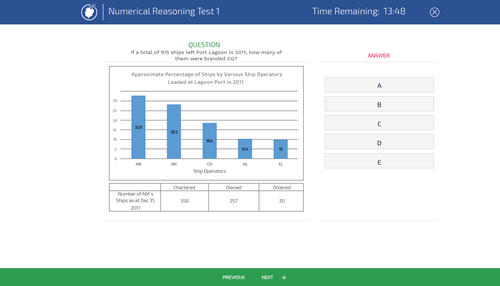- 197 Tests
- 3146 Questions
- One-off payment
Guidelines to excel in Numerical Reasoning Tests
What are Numerical Reasoning Tests?
Numerical reasoning tests help gauge the candidate's ability to infer, assess and deduce logical interpretation based on the data presented. It is significant to note that numerical reasoning tests are not intended towards measuring one's ability to be good at mathematics. Instead, they are designed to judge one's capability to make use of data to formulate logical decisions.
Significance of numerical reasoning tests for employers
Organizations generate reports consisting of numbers, charts, tables and figures to represent cash inflow against outflows or trends for showing the company's sales and overall progress over a period of time. This numerical information has a vital role to play in making decisions regarding the finances, human resource, and asset management; and also in setting future business goals of the organization. Thus, stakeholders expect their employees to be able to effectively gather, analyze and present the data in the company's favour.
Example of what a Numerical Reasoning Test looks like:
What to expect in a numerical reasoning test?
Numerical reasoning tests are based on tabulated data and charts representing different business-associated scenarios. Followed by each scenario are questions connecting to the information provided. Tests are generally taken in the form of multiple-choice questions and the answer has to be given based upon the information presented. These tests are usually time-bound, though time limits may vary. As a rule of thumb, one should be prepared for 60 seconds per question time limit.
Numerical reasoning tests are not aimed at gauging arithmetical skills. Therefore, simple calculators are generally allowed during the test. Instructions regarding the use of calculators are issued before the test commencement.
Numerical reasoning tests are taken to evaluate job candidates based on organizational hierarchical structure i.e. trainees, section heads, managers, etc. Different complexity levels are incorporated to ensure the credibility and effectiveness of the test.
Candidates have to demonstrate their reasoning skills as required by the position they have applied for. Reasoning skills required by a management applicant are far stronger than a fresh graduate trainee. The kind of role applied for in an organization also defines the difficulty level of the test. For example, a graduate employed for an engineering-related job has to have superior reasoning skills than an accountant.
What does the level of difficulty mean?
Numerical reasoning tests have a level of difficulty that is uniform throughout all the questions. The difficulty of a reasoning test is defined considering three factors - subject complexity, amount of information provided and time restrictions. The higher the difficulty level of the test, the more complex the questions get.
Subject complexity is defined by the number of interpretations and transformations one has to make to have the correct answer. The amount of data provided for a particular question helps judge how well a candidate can stay focused on the concerned problem. It is used as a tool to diverge the candidate's attention and test his ability to use the given time effectively. The higher the difficulty level is, the greater the distracting data gets. Time restriction is another important feature of numerical reasoning tests. One has an average of 40-60 seconds to answer a question. But as the difficulty level increases, the time allowed to answer a single question is reduced.
Summarizing the facts stated above, despite having fine skills in mathematics and in working out numerical reasoning problems, one might still come up with something new and mind-tweaking while taking the actual test. Therefore, it is recommended to practice a lot of mock tests before appearing in the final test. There are online practise tests available that are in line with the actual tests the employees are expected to take part in.
After the completion of the online mock test, the software provides a detailed report consisting of marks scored and a detailed explanation of every answer. This helps the user correct his mistakes and induces a process of self-tutoring so that the errors are not carried forward to the next test. A user is also guided regarding how to approach a particular question, relevant strategies, and techniques to save time and give the correct answer.
Reasoning test score interpretation
The scores of a numerical reasoning test are evaluated in a similar way as other aptitude tests i.e. on a percentile basis. The score of an individual is evaluated relative to a benchmark. The benchmark is calculated considering the test scores of other employees of the organization in the given checkout or for a particular area of interest one is applying for.
For instance, if one applies for a job in administration and is provided with a numerical reasoning test to solve, the tally score (number of correct answers) is then compared with the scores of people who applied for a job in the administration business. This procedure facilitates the employer to discover how good a particular employee is in numerical reasoning skills in comparison to other people in the organization.
There isn't any par score for the numerical reasoning test. Test results are calculated relative to that of others in analogous trades. This denotes that even if you correctly answer nearly all the problems in the numerical reasoning test, the score may still be lower than that of other employees in similar roles.
For example, suppose an applicant answered 16 out of 20 problems correctly which was considered to be a satisfactory score. But as a matter of fact, people who appeared in a similar category have an average score of 18 out of 20. This means the result was not actually satisfactory, instead, it was below average and the examinee needs to have more practise to achieve a better score.
How can Assessment-Training.com help you ace your Numerical Reasoning Test?
Assessment-Training.com is your number 1 online practise aptitude test and assessment provider. We aim to help you ace your assessment by providing you with practise aptitude tests that mimic the tests used by employers and recruiters. Our test developers have years of experience in the field of occupational psychology and developed the most realistic and accurate practice tests available online. Our practise platform uses leading-edge technology and provides you feedback on your scores in form of test history, progress and performance to your norm group.
Check out our tailor-made Numerical Reasoning Test Pack to fully prepare you for your assessment.
The Assessment-Training.com data science team found that candidates increased their scoring accuracy through practice and went into their assessments more confident. Remember, you need to practice to make sure you familiarize yourself with the test formats, work on your accuracy and experience performing under time pressure.
Numerical Reasoning
- 12 Tests
- 240 Questions
- One-off payment
- 197 Tests
- 3146 Questions
- One-off payment
Numerical Reasoning
- 12 Tests
- 240 Questions
- One-off payment
